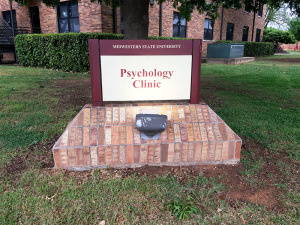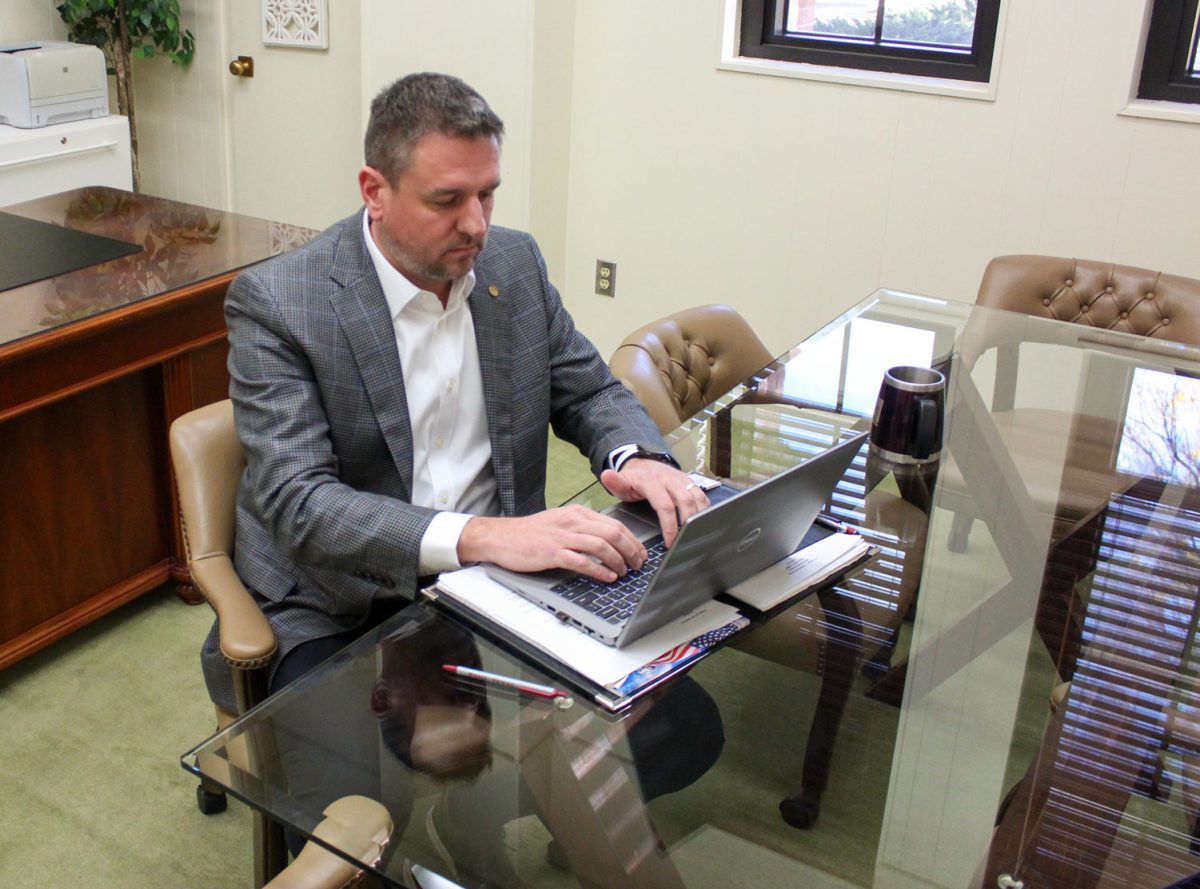
Although the psychology clinic may not be well known around campus, it offers free counseling and low-cost assessments for various mental illnesses.
Psychology professor and clinic supervisor, Michael Vandehey, hopes to de-stigmatize counseling and making it preventative.
“What I wish people understood about counseling is that it’s preventative. Why wait until it’s so bad that your life is being interrupted significantly?” Vandehey said.
He compared the human brain to other illnesses.
“No one ever looks at you and says ‘You’re diabetic, that’s all in your brain. Just stop taking your insulin. There’s a real confusion. There’s a shock to a lot of people in America. Did you know that the brain is connected to the body, and it’s an organ?” Vandehey said. “Just like you don’t feel well in your stomach or kidneys or heart, that can affect the way your mood is. Maybe your mood can affect the way your body functions because the brain is connected to the body.”
Vandehey claims that we keep separating the brain as it just thinks differently, but that’s just the way the organ works. We know about neurotransmitters, hormones and nutrition. So he asks, why do we stigmatize it?
According to Vandehey, to grow is to change. Visitors range from adolescents, couples, families and students.
“You may have a great five-year-old that’s a miserable seven-year-old that’s a fine eight-year-old,” Vandehey said. “So let’s get it when it starts to be problematic. By the time most couples come in they’ve done everything possible. Bitterness and resentment is built up.”
Clinicians
The clinic, under the supervision of psychology professor Michael Vandehey, associate psychology professor Paul Guthrie, and psychology professor David Carlston, is operated by second year master students at MSU. Before the students start at the clinic, they are required to have about 30 hours of their masters done, and have to take set classes.
Clinical counseling psychology masters student, Bevin Pierce, said,“It’s not uncommon at all to be struggling throughout college. Everyone struggles with something and it’s a big step for them to come talk to us.”
Pierce said they try to do everything they can for patients to change or relieve whatever is going on. They go through various courses here that are geared towards doing that.
There are three clinicians right now, but it rotates so there is a new set of clinicians every semester. Training includes a 60 hour masters degree, and they must complete three practicum courses successfully, one on campus and two out in the community. Most of the clinicians will continue to see one or two people from the clinic.
“It’s really nice for students to have a place to go. We get referrals from the counseling center and vice versa,” Pierce said. “It just depends on how many people are working in the clinic, and our limit is six clients a person.”
If the number of clients are maxed, the clinicians first send students to the counseling center, and if that is full they have other referral lists.
“It’s also nice to have the counseling center, because if a student is a psychology major then we don’t see them because we teach,” Pierce said.
The supervisors highly encourage all counselors to go to counseling due to vicarious traumatization.
“One of the things we do is help people who have had trauma and post traumatic stress disorder. So you see vicarious traumatization in therapists having not experienced the trauma, except that they have because they’re dealing with the emotions and the memories and reports in therapy. So even as you go on through your career, therapists don’t always make the best parent or partner because they come home exhausted or stressed out,” Vandehey said.
Vandehey said life comes up and clinicians should get better at being preventative.
“You don’t get to do something like this until you get here. This might be something you want to do until you really do it. You don’t really know what’s going on, how much work it takes, and how much you put into each person, but it’s because you want to,” Pierce said. “It’s cool I get to learn that about myself.”
The clinic does assessment work. They have personality assessments, MMPI (test to help identify personal, social, and behavioral problems in psychiatric patients), depression inventory, anxiety inventory, and IQ testing.
Pierce says all clients are weekly, some are twice a week. There are also booster sessions after a patient has finished with their needed weekly visits. Booster sessions are about once a month.
“Some people need every now and then someone just looking out for them and update on skills they’ve learned,” Pierce said.
If students’ problems are resolved, the clinic does a “termination” letter.
“It only sounds harsh. We write a summary and come together having those last sessions knowing it’s the end of it. They can also request their records anytime they need to,” Pierce said.
Master students have gone to work in the community at First Step, the state hospital, Taft Counseling Center, and juvenile probation.
Values
The U.S. has its own national ethics, that most states have adopted their state ethics. If an ethic is violated, clinicians lose their license and have to go through a two year probation.
Vandehey said, “Values-based [counseling] allows us to work with people with a variety of values. For example, crossed-religions, even though we’re not ministers, but people can come with a variety of belief systems and backgrounds.”
There are different values based on different resources.
“We do value exercises that help clarify patients values. Values card sorts are fun,” Vandehey said. “It’s an interaction of how you can include this value, chose this not that, and which ones you see overlapping. You leave here saying ‘This is who I am and this is the direction I’m going.”
Clinicians values, however, do not have to be thrown out the window.
“We’re human and I never want a client with a therapist that’s tolerating them. If we have identified an individual that we don’t feel comfortable, we would transfer them and provide training to the clinician,” Vandehey said.
When entering the clinic, there is paperwork to fill out. Patients provide information and have a pretty set “intake” interview. Students are in training, and so there are two to three sessions to complete that.
The mandatory first questions identify with self-harm and harm to others. One of the values is if the patients identify with child abuse, elder abuse, or an elder with intellectual deficiency, the clinicians are a mandatory reporter to child or adult protective services. If it is harm to other, and a reasonable risk, they contact the sheriff’s department, and it’s their job to figure out if that person is a danger to others.
“Fortunately, we’ve never had to do that,” Vandehey said with a laugh. “Part of a good, therapeutic relationship is building a trusting relationship and is feeling safe sharing things that patients don’t even want their best friend or partner to know.”
Visits
The clinic is located in the O’Donohoe wing of the Prothro-Yeager Hall off of Council Drive. Parking is available adjacent to the entrance. It is open Monday through Friday 9 a.m.-4 p.m.
If not a student or faculty/staff member, most sessions are $5 for the community. The clinic does not take insurance. Friends and family of students or faculty are free, too.
“The neat thing is, it’s in a building that regularly has students. So, in that sense, there can be a real amenity for people in the community,” Vandehey said. “Someone in the community might not be worried about bumping into someone, but we have really good confidentiality.”
The clinic honors school breaks and is closed when MSU is closed.
“Because we honor school breaks, we usually lose individuals and intakes go down. But right now, in the middle of the semester, we’re on a wait list,” Vandehey said.
Depression and anxiety from MWSU Campus Watch on Vimeo.
Read the rest of the mental health series articles:
Under Pressure: Anxiety is more common than you think
Depression at MSU: ‘I’ve thought about suicide’
Suicide prevention training hits close to home
Counselors: Nothing is off limits












